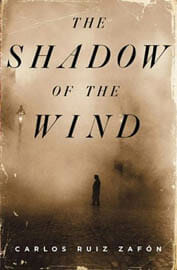
An apt title for the fat bestseller it names, The Shadow of the Wind is gorgeously suggestive; never mind that it connotes nothing beyond a picturesque insubstantiality. Zafon’s novel wants to be a full-bodied, racy, pulp literary work that succeeds also as a study of character, the love of books (and of women, and of fathers), and Franco’s post-revolutionary Spain. But his style is clumsy and imprecise, his dialogue utterly stilted; you can tell when he’s trying to make a minor character seem unique by the identical “Ah, young man, let me tell you about women …” speeches he assigns them, or the sudden eruption—no pun intended—of dumb fart jokes.
But you can forgive the ham-fisted approach because his basic story is so cool. One misty morning a young boy follows his widowed father to the secret Cemetery of Forgotten Books—a splendid Borgesian/ Spielbergian construction where unread books enjoy eternal rest. Here he falls in love with a novel, The Shadow of the Wind by Julian Carax; subsequently, his life begins to resemble that of the book’s mysterious author; he finds himself pursued by government agents and a faceless madman straight out of Carax’s own novel, who is intent on destroying every last one of Carax’s books. Zafon’s invention gallops and pirouettes, light-years ahead of his skill as a writer.